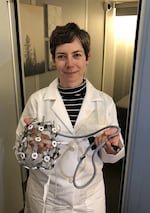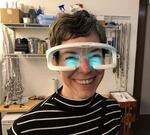Research carried out by the University of Oregon and its partners has found another reason to be concerned about sleep disorders.
While disrupted or reduced sleep has been linked to depression and anxiety, researchers have found it can also contribute to suicidal thoughts in young people.

University of Oregon psychology professor Melynda Casement stands outside a sleep pod, with an EEG (electroencephalogram) set used to measure subjects' brainwaves. Casement came to the UO in the fall of 2016, with the sleep lab facility opening earlier this year.
Brian Bull/KLCC
Melynda Casement is an associate professor of psychology, who co-led the study along with Jason Carbone, an assistant professor of social work at Wayne State University.
Their study looked at national emergency records for youth between the ages of 6 and 24. Those with a sleep disorder were three times more likely to express suicidal thoughts than those who did not.
“The rates of suicide are very high among adolescents and young adults are the third leading cause of death and unfortunately, sleep disorders are one of the risk factors for suicide,” Casement told KLCC. “This really points out the importance of sleep to mental health.”
Casement stressed that this is an example of correlation, not causation. And researchers say assessment and intervention for sleep disorders should be part of suicide prevention efforts. This could include screening youth for such disorders when they come to the ER.
“Being aware of the impact of sleep disruption gives us an avenue to try to address sleep issues as well as downstream consequences,” Casement said in a UO release. “Suicide is still stigmatized in many communities; sleep is less so. Identifying and treating sleep disorders could improve mental health and reduce suicide risk even if people aren’t comfortable opening up about their mental health challenges.
“It gives us a wider range of inroads to tackle suicidal ideation and mental health — you can address the sleep problem and have good effects on mood and anxiety,” Casement said.
The researchers’ findings were published in the June 15 edition of the journal, Sleep Health.

University of Oregon psychology professor Melynda Casement sports a pair of light therapy glasses, which she says reinforces or changes the wearer's circadian rhythms. "Morning light can help shift circadian rhythms to an earlier schedule, which is called a phase advance," she explained to KLCC.
Brian Bull/KLCC
Sleep lab now open for science
While sleeping on the job usually gets one fired, the University of Oregon researchers will actually pay you for snoozing on the clock.
The UO’s sleep lab facility opened earlier this year in the psychology department. Casement said they need participants, as well as assistants who’ll monitor them in two designated sleep “pods.” One is a casual lounge setting, while the other is a bed space.
Casement added that, unlike many other sleep studies that have deprived subjects of sleep, this one will have them grab more.
“And then seeing what impact that might have,” she said.
“We’re actually looking specifically for people who might not be getting enough sleep because maybe they’re going to bed too late or they don’t have quite as many hours of sleep as we would recommend for adolescents and young adults. Because we think that that population might be at, specific risk for depression and risky alcohol use because they’re not getting enough sleep.”
Sleep study participants can make up to $630. They must be willing to share information about their mental health, submit samples of their saliva and urine, and complete an MRI scan and other laboratory tasks.
More details are online at sleepstudy.uoregon.edu.
The UO sleep lab is funded by the universities of Oregon and Pittsburgh, as well as the Oregon Research Institute, and the National Institutes of Health.
Nearly $1.3 million in federal money has been granted to Casement’s team for two separate studies looking at the role of sleep in well-being and risk-taking.